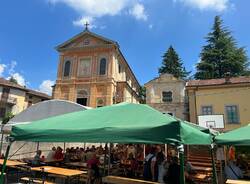Merletti: “I won’t treat Minister Boschi badly”
Interview with the national President of Confartigianato on the topics he is going to cover during the assembly at EXPO2015

Giorgio Merletti, the national President of Confartigianato, is as much an expert at speaking off the cuff in his speeches in public, as is Prime Minister Matteo Renzi. And in spite of good intentions, we can bet that during the national assembly of craftspeople, at EXPO, on Wednesday 20 May, Merletti will save some surprises for the public.
Mr President, you generally don’t make allowances for politics. On Wednesday, Minister Boschi will be at EXPO. Will you make an exception, or not?
“We’re pleased that Ms Boschi is coming. It’s also true that I’ve never been gentle with politicians, but I generally get angry when they talk about things they don’t know and only for propaganda purposes.”
So, would it be better for Ms Boschi not to make any new announcements during the meeting?
“No one can do miracles, not even Renzi and his government, even though the Prime Minister emphasises everything he does. I think it would be better to set few goals and establish priorities with respect to a series of things that are necessary for businesses and for the country.”
For example?
“Things we’ve been saying for a long time. For example, to reduce the fiscal pressure, to streamline the bureaucracy and to free up payments by the public administration.”
The Jobs Act is a successfully completed reform. What’s your opinion of it?
“Not bad. It’s true that jobs have increased, and we all hope they remain and are consolidated, but we mustn’t forget that the increase in employment has been registered since 1 January, not since the reform came into force, because there was the tax incentive from the stability law. Today, it’s more convenient for a businessperson to employ because he already knows how much he will pay in the event of a breach of contract. For the first time, an employment reform doesn’t look at the business with prejudice. What I don’t like is that contracts with increasing protections are cannibalising apprenticeships, and this is a contradiction because it cancels the model of work-related learning, which, in other countries, such as Switzerland and Germany, works very well. And then there’s the question of the social security net, which, for 40 years, the crafts world has managed perfectly, thanks to bilateralism, without asking for anything from the State.”
It isn’t a very negative assessment.
“Well, if you want we can talk about the blank fiscal mandate of Parliament and about the inactivity on such a crucial matter. I realise that after a seven-year crisis like the one we’ve been through, it’s not easy. But I think the great mistake in the politics during this period is that of having wanted to step over the intermediary organisations to avoid consultation, instead of listening to them, because they know better than anyone else what is happening in this country and above all they know the people.”
Why is it so important to streamline the bureaucracy?
“Because behind it, there is almost always a bribe.”
In your opinion, will the reduction in taxes lead also to a reduction in tax evasion?
“The President of the Republic Luigi Einaudi said it would, and I think he was right. I’ll give you some figures to illustrate: between 2005 and 2015, Italy paid €29 billion more in taxes, than the other European countries. Taxation per capita, including children, is €476. The local council property tax (ICI) amounted to €10 billion, but with the council tax (IMU) and the service tax (TASI), there has been a 150% increase. So, we should start cutting public spending seriously.”
A reduction in public spending is counterproductive for politics, because of the popular consensus.
“In fact, after seven years of crisis, it would be aa comfort for the politicians who are in crisis. In the UK, David Cameron cut primary public spending by 5%, and he won. Schröder cut it in 2005, and took a beating. But in Italy, public spending has risen by one point, and when the government in power finds a little treasure, it immediately thinks about how to spend it.”
So, what do we need in order to get the economy going again?
“My father, who wasn’t an economist, always said that the country is fine when the cranes are working, that is, when the construction industry is working, because that’s a sector that can pull everything else along with it. Unfortunately, at the moment, the cranes aren’t working. It’s a simple rule but one that has worked since the unification of Italy; they breached the walls and created an economy.”
TAG ARTICOLO
La community di VareseNews
Loro ne fanno già parte
Ultimi commenti
Felice su Trenta mila euro per affittare un bosco come piazza di spaccio in provincia di Varese
Felice su I boschi sono di tutti, non di chi spaccia
GrandeFratello su Vandalizzato il belvedere di San Fermo che i residenti stavano ripristinando
lenny54 su Dal 1° agosto scatta l'aumento sul servizio Malpensa Express da Milano all'aeroporto
Roberto Ganna su Elsa Fornero a Varese: “Abbiamo tolto futuro ai giovani. Ora dobbiamo restituirglielo”
Baffetta su Elsa Fornero a Varese: “Abbiamo tolto futuro ai giovani. Ora dobbiamo restituirglielo”
















Accedi o registrati per commentare questo articolo.
L'email è richiesta ma non verrà mostrata ai visitatori. Il contenuto di questo commento esprime il pensiero dell'autore e non rappresenta la linea editoriale di VareseNews.it, che rimane autonoma e indipendente. I messaggi inclusi nei commenti non sono testi giornalistici, ma post inviati dai singoli lettori che possono essere automaticamente pubblicati senza filtro preventivo. I commenti che includano uno o più link a siti esterni verranno rimossi in automatico dal sistema.